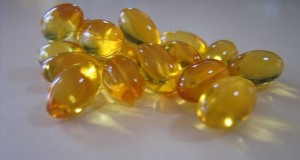
Photo credit: flickr
Nowadays researchers and consumers talk a lot about the benefits of conjugated linoleic acid for the human health. Conjugated linoleic acid (CLA) is a geometric and positional isomer of linoleic acid. Does Safflower Oil Have CLA? It is known that conjugated linoleic acid is available in large amounts in dairy products and beef. It is believed to be effective for supporting the immune system functioning, for preventing atherosclerosis and cancer. Bodybuilders are attracted by CLA properties for weight loss and increasing muscle mass.
Contents
Conjugated linoleic acid from safflower oil
CLA can be extracted from safflower oil. There is no CLA in safflower oil. One type of safflower oil contains linoleic acid. In a manufacturing process CLA is extracted from it by conjugating the acid. As a result, we have conjugated linoleic acid. According to Wikipedia, bacteria that live in the humans’ intestinal tract can convert linoleic acid from safflower oil into CLA. Remember that according to safflower oil nutrition data only safflower oil high in polyunsaturated fatty acids contains linoleic acid. Don’t confuse with high oleic acid safflower oil rich in monounsaturated fats without linoleic acid in its composition.
Producers of CLA supplements use safflower oil for CLA manufacturing. Safflower oil CLA supplements contain 80% of CLA while sunflower CLA supplements comprise only 40%. So if you want to get CLA from supplements buy safflower CLA ones.
SEE ALSO: What are the Health Benefits of Sunflower Oil?
Benefits of conjugated linoleic acid
- Weight loss. CLA has been clinically proven to help lower body fat. It increases lean muscle mass.
- A study has determined that conjugated linoleic acid possesses antioxidant and anti-atherosclerotic activities.
- CLA has been shown to suppress colon tumor proliferation in vivo and in vitro. Studies prove that conjugated linoleic acid may lower the risk of breast, skin, stomach and prostate cancers.
- CLA strengthens the immune function, improving lymphocyte proliferation and increasing CD8+ lymphocytes. It is also believed to reduce interleukin-lbeta and PGE2 production.
More studies are needed to prove the benefits of CLA in safflower oil. Read also about safflower oil benefits.
QUESTION ANSWERED: Are There Any Side Effects of Safflower Oil?
Side effects of CLA
Overdosing of CLA intake may lead to side effects, as GNet.Org warns. The studies have shown that large doses of CLA (4.5 g daily) raise the level of cholesterol in the blood of overweight people. Another possible danger of conjugated linoleic acid is the fatty liver. As CLA may have serious side effects you should consult your doctor before supplementing it.
 Oilypedia.com – Benefits And Uses Of Supplemental and Essential Oils
Oilypedia.com – Benefits And Uses Of Supplemental and Essential Oils 


